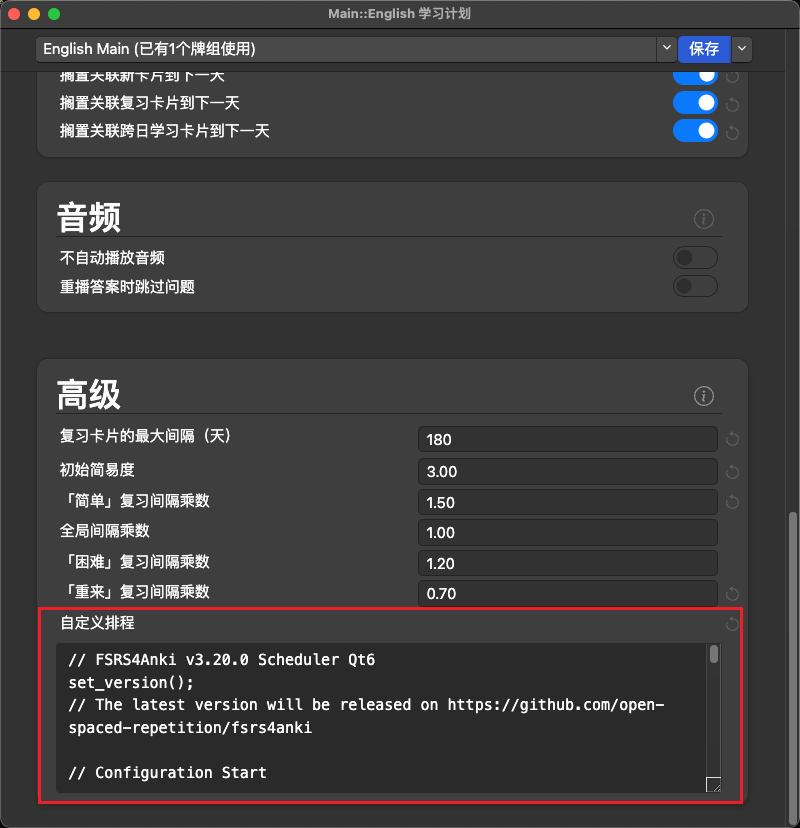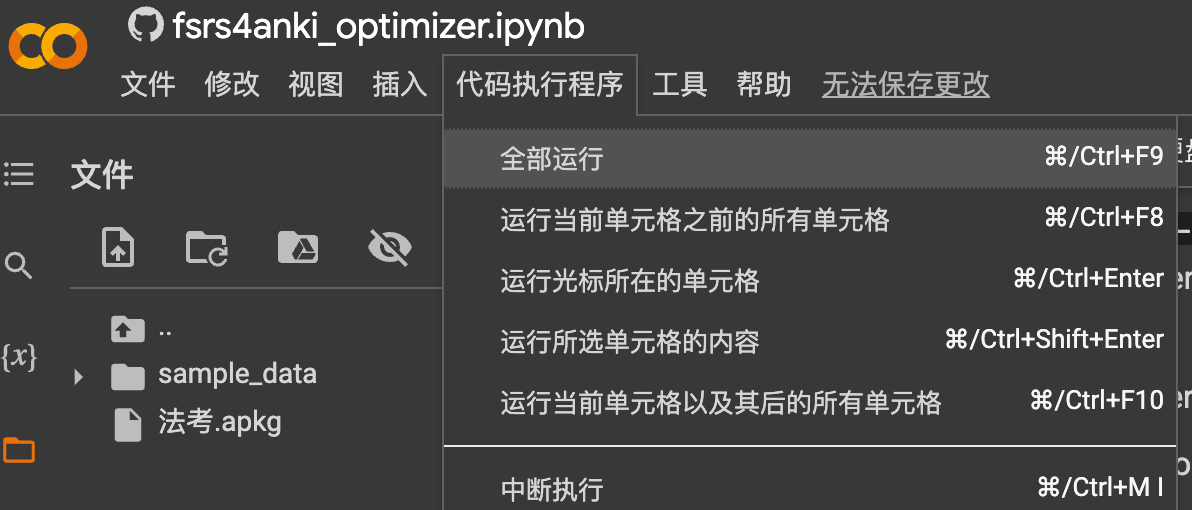FSRS4Anki 使用指北
阅读须知:该教程只适用于 Anki 2.1.62-2.1.66。新版本的教程在此:Anki 新算法 FSRS 配置指南。
0 介绍
FSRS4Anki,即 Free Spaced Repetition Scheduler for Anki,一款能在 Anki 上运行的自由、开源的间隔重复调度算法。相较于 Anki 内置的、有着长达 30 年历史的 SM-2 算法,FSRS 更新、更准、更强。
FSRS4Anki 主要分为三个部分:Scheduler(调度器)、Optimizer(优化器)和 Helper(助手插件)。
- Scheduler 可以根据当前卡片的记忆状态、复习间隔和复习打分来预测记忆状态的变化,并给出合适的复习间隔。
- Optimizer 可以根据学习者上传的历史复习记录,生成拟合学习者记忆情况的模型权重。
- Helper 以 FSRS 记忆状态为核心,允许学习者更加灵活地复习。
以下是 FSRS4Anki 的使用教程。
1 快速上手
1.1 开启 Anki 的 V3 排程算法
勾选设置>复习>启用 V3 排程算法

1.2 粘贴 FSRS 算法代码

在牌组选项中,找到高级设置一栏,在自定义排程中粘贴以下代码:
// FSRS4Anki v4.3.0 Scheduler Qt6
set_version();
// The latest version will be released on https://github.com/open-spaced-repetition/fsrs4anki/releases/latest
// Configuration Start
const deckParams = [
{
// Default parameters of FSRS4Anki for global
"deckName": "global config for FSRS4Anki",
"w": [0.4, 0.6, 2.4, 5.8, 4.93, 0.94, 0.86, 0.01, 1.49, 0.14, 0.94, 2.18, 0.05, 0.34, 1.26, 0.29, 2.61],
// The above parameters can be optimized via FSRS4Anki optimizer.
// For details about the parameters, please see: https://github.com/open-spaced-repetition/fsrs4anki/wiki/The-Algorithm
// User's custom parameters for global
"requestRetention": 0.9, // recommended setting: 0.8 ~ 0.9
"maximumInterval": 36500,
// FSRS only modifies the long-term scheduling. So (re)learning steps in deck options work as usual.
// I recommend setting steps shorter than 1 day.
},
{
// Example 1: User's custom parameters for this deck and its sub-decks.
"deckName": "MainDeck1",
"w": [0.6, 0.9, 2.9, 6.8, 4.72, 1.02, 1, 0.04, 1.49, 0.17, 1.02, 2.15, 0.07, 0.35, 1.17, 0.32, 2.53],
"requestRetention": 0.9,
"maximumInterval": 36500,
},
{
// Example 2: User's custom parameters for this deck and its sub-decks.
// Don't omit any keys.
"deckName": "MainDeck2::SubDeck::SubSubDeck",
"w": [0.6, 0.9, 2.9, 6.8, 4.72, 1.02, 1, 0.04, 1.49, 0.17, 1.02, 2.15, 0.07, 0.35, 1.17, 0.32, 2.53],
"requestRetention": 0.9,
"maximumInterval": 36500,
}
];
// To turn off FSRS in specific decks, fill them into the skip_decks list below.
// Please don't remove it even if you don't need it.
const skip_decks = ["MainDeck3", "MainDeck4::SubDeck"];
// "Fuzz" is a small random delay applied to new intervals to prevent cards from
// sticking together and always coming up for review on the same day
const enable_fuzz = true;
// FSRS supports displaying memory states of cards.
// Enable it for debugging if you encounter something wrong.
const display_memory_state = false;
// Configuration End
debugger;
// display if FSRS is enabled
if (display_memory_state) {
const prev = document.getElementById('FSRS_status')
if (prev) { prev.remove(); }
var fsrs_status = document.createElement('span');
fsrs_status.innerHTML = "<br>FSRS enabled";
fsrs_status.id = "FSRS_status";
fsrs_status.style.cssText = "font-size:12px;opacity:0.5;font-family:monospace;text-align:left;line-height:1em;";
document.body.appendChild(fsrs_status);
document.getElementById("qa").style.cssText += "min-height:50vh;";
}
let params = {};
// get the name of the card's deck
if (deck_name = get_deckname()) {
if (display_memory_state) {
fsrs_status.innerHTML += "<br>Deck name: " + deck_name;
}
for (const i of skip_decks) {
if (deck_name.startsWith(i)) {
fsrs_status.innerHTML = fsrs_status.innerHTML.replace("FSRS enabled", "FSRS disabled");
return;
}
}
// Arrange the deckParams of sub-decks in front of their parent decks.
deckParams.sort(function(a, b) {
return -a.deckName.localeCompare(b.deckName);
});
for (let i = 0; i < deckParams.length; i++) {
if (deck_name.startsWith(deckParams[i]["deckName"])) {
params = deckParams[i];
break;
}
}
} else {
if (display_memory_state) {
fsrs_status.innerHTML += "<br>Deck name not found";
}
}
if (Object.keys(params).length === 0) {
params = deckParams.find(deck => deck.deckName === "global config for FSRS4Anki");
}
var w = params["w"];
var requestRetention = params["requestRetention"];
var maximumInterval = params["maximumInterval"];
// auto-calculate intervalModifier
const intervalModifier = 9 * (1 / requestRetention - 1);
// global fuzz factor for all ratings.
const fuzz_factor = set_fuzz_factor();
const ratings = {
"again": 1,
"hard": 2,
"good": 3,
"easy": 4
};
// For new cards
if (is_new()) {
init_states();
const good_interval = next_interval(customData.good.s);
const easy_interval = Math.max(next_interval(customData.easy.s), good_interval + 1);
if (states.good.normal?.review) {
states.good.normal.review.scheduledDays = good_interval;
}
if (states.easy.normal?.review) {
states.easy.normal.review.scheduledDays = easy_interval;
}
// For learning/relearning cards
} else if (is_learning()) {
// Init states if the card didn't contain customData
if (is_empty()) {
init_states();
}
const good_interval = next_interval(customData.good.s);
const easy_interval = Math.max(next_interval(customData.easy.s), good_interval + 1);
if (states.good.normal?.review) {
states.good.normal.review.scheduledDays = good_interval;
}
if (states.easy.normal?.review) {
states.easy.normal.review.scheduledDays = easy_interval;
}
// For review cards
} else if (is_review()) {
// Convert the interval and factor to stability and difficulty if the card didn't contain customData
if (is_empty()) {
convert_states();
}
const interval = states.current.normal?.review.elapsedDays ? states.current.normal.review.elapsedDays : states.current.filtered.rescheduling.originalState.review.elapsedDays;
const last_d = customData.again.d;
const last_s = customData.again.s;
const retrievability = Math.pow(1 + interval / (9 * last_s), -1)
if (display_memory_state) {
fsrs_status.innerHTML += "<br>D: " + last_d + "<br>S: " + last_s + "<br>R: " + (retrievability * 100).toFixed(2) + "%";
}
customData.again.d = next_difficulty(last_d, "again");
customData.again.s = next_forget_stability(customData.again.d, last_s, retrievability);
customData.hard.d = next_difficulty(last_d, "hard");
customData.hard.s = next_recall_stability(customData.hard.d, last_s, retrievability, "hard");
customData.good.d = next_difficulty(last_d, "good");
customData.good.s = next_recall_stability(customData.good.d, last_s, retrievability, "good");
customData.easy.d = next_difficulty(last_d, "easy");
customData.easy.s = next_recall_stability(customData.easy.d, last_s, retrievability, "easy");
let hard_interval = next_interval(customData.hard.s);
let good_interval = next_interval(customData.good.s);
let easy_interval = next_interval(customData.easy.s);
hard_interval = Math.min(hard_interval, good_interval)
good_interval = Math.max(good_interval, hard_interval + 1);
easy_interval = Math.max(easy_interval, good_interval + 1);
if (states.hard.normal?.review) {
states.hard.normal.review.scheduledDays = hard_interval;
}
if (states.good.normal?.review) {
states.good.normal.review.scheduledDays = good_interval;
}
if (states.easy.normal?.review) {
states.easy.normal.review.scheduledDays = easy_interval;
}
}
function constrain_difficulty(difficulty) {
return Math.min(Math.max(+difficulty.toFixed(2), 1), 10);
}
function apply_fuzz(ivl) {
if (!enable_fuzz || ivl < 2.5) return ivl;
ivl = Math.round(ivl);
let min_ivl = Math.max(2, Math.round(ivl * 0.95 - 1));
let max_ivl = Math.round(ivl * 1.05 + 1);
if (is_review()) {
const scheduledDays = states.current.normal?.review.scheduledDays ? states.current.normal.review.scheduledDays : states.current.filtered.rescheduling.originalState.review.scheduledDays;
if (ivl > scheduledDays) {
min_ivl = Math.max(min_ivl, scheduledDays + 1);
}
}
return Math.floor(fuzz_factor * (max_ivl - min_ivl + 1) + min_ivl);
}
function next_interval(stability) {
const new_interval = apply_fuzz(stability * intervalModifier);
return Math.min(Math.max(Math.round(new_interval), 1), maximumInterval);
}
function next_difficulty(d, rating) {
let next_d = d - w[6] * (ratings[rating] - 3);
return constrain_difficulty(mean_reversion(w[4], next_d));
}
function mean_reversion(init, current) {
return w[7] * init + (1 - w[7]) * current;
}
function next_recall_stability(d, s, r, rating) {
let hardPenalty = rating === "hard" ? w[15] : 1;
let easyBonus = rating === "easy" ? w[16] : 1;
return +(s * (1 + Math.exp(w[8]) *
(11 - d) *
Math.pow(s, -w[9]) *
(Math.exp((1 - r) * w[10]) - 1) *
hardPenalty *
easyBonus)).toFixed(2);
}
function next_forget_stability(d, s, r) {
return +Math.min(w[11] *
Math.pow(d, -w[12]) *
(Math.pow(s + 1, w[13]) - 1) *
Math.exp((1 - r) * w[14]), s).toFixed(2);
}
function init_states() {
customData.again.d = init_difficulty("again");
customData.again.s = init_stability("again");
customData.hard.d = init_difficulty("hard");
customData.hard.s = init_stability("hard");
customData.good.d = init_difficulty("good");
customData.good.s = init_stability("good");
customData.easy.d = init_difficulty("easy");
customData.easy.s = init_stability("easy");
}
function init_difficulty(rating) {
return +constrain_difficulty(w[4] - w[5] * (ratings[rating] - 3)).toFixed(2);
}
function init_stability(rating) {
return +Math.max(w[ratings[rating] - 1], 0.1).toFixed(2);
}
function convert_states() {
const scheduledDays = states.current.normal ? states.current.normal.review.scheduledDays : states.current.filtered.rescheduling.originalState.review.scheduledDays;
const easeFactor = states.current.normal ? states.current.normal.review.easeFactor : states.current.filtered.rescheduling.originalState.review.easeFactor;
const old_s = +Math.max(scheduledDays, 0.1).toFixed(2);
const old_d = constrain_difficulty(11 - (easeFactor - 1) / (Math.exp(w[8]) * Math.pow(old_s, -w[9]) * (Math.exp(0.1 * w[10]) - 1)));
customData.again.d = old_d;
customData.again.s = old_s;
customData.hard.d = old_d;
customData.hard.s = old_s;
customData.good.d = old_d;
customData.good.s = old_s;
customData.easy.d = old_d;
customData.easy.s = old_s;
}
function is_new() {
if (states.current.normal?.new !== undefined) {
if (states.current.normal?.new !== null) {
return true;
}
}
if (states.current.filtered?.rescheduling?.originalState !== undefined) {
if (Object.hasOwn(states.current.filtered?.rescheduling?.originalState, 'new')) {
return true;
}
}
return false;
}
function is_learning() {
if (states.current.normal?.learning !== undefined) {
if (states.current.normal?.learning !== null) {
return true;
}
}
if (states.current.filtered?.rescheduling?.originalState !== undefined) {
if (Object.hasOwn(states.current.filtered?.rescheduling?.originalState, 'learning')) {
return true;
}
}
if (states.current.normal?.relearning !== undefined) {
if (states.current.normal?.relearning !== null) {
return true;
}
}
if (states.current.filtered?.rescheduling?.originalState !== undefined) {
if (Object.hasOwn(states.current.filtered?.rescheduling?.originalState, 'relearning')) {
return true;
}
}
return false;
}
function is_review() {
if (states.current.normal?.review !== undefined) {
if (states.current.normal?.review !== null) {
return true;
}
}
if (states.current.filtered?.rescheduling?.originalState !== undefined) {
if (Object.hasOwn(states.current.filtered?.rescheduling?.originalState, 'review')) {
return true;
}
}
return false;
}
function is_empty() {
return !customData.again.d | !customData.again.s | !customData.hard.d | !customData.hard.s | !customData.good.d | !customData.good.s | !customData.easy.d | !customData.easy.s;
}
function set_version() {
const version = "v4.3.0";
customData.again.v = version;
customData.hard.v = version;
customData.good.v = version;
customData.easy.v = version;
}
function get_deckname() {
if (typeof ctx !== 'undefined' && ctx.deckName) {
return ctx.deckName;
} else if (document.getElementById("deck") !== null && document.getElementById("deck").getAttribute("deck_name")) {
return document.getElementById("deck").getAttribute("deck_name");
} else {
return null;
}
}
function get_seed() {
if (!customData.again.seed | !customData.hard.seed | !customData.good.seed | !customData.easy.seed) {
if (typeof ctx !== 'undefined' && ctx.seed) {
return ctx.seed;
} else {
return document.getElementById("qa").innerText;
}
} else {
return customData.good.seed;
}
}
function set_fuzz_factor() {
// Note: Originally copied from seedrandom.js package (https://github.com/davidbau/seedrandom)
!function(f,a,c){var s,l=256,p="random",d=c.pow(l,6),g=c.pow(2,52),y=2*g,h=l-1;function n(n,t,r){function e(){for(var n=u.g(6),t=d,r=0;n<g;)n=(n+r)*l,t*=l,r=u.g(1);for(;y<=n;)n/=2,t/=2,r>>>=1;return(n+r)/t}var o=[],i=j(function n(t,r){var e,o=[],i=typeof t;if(r&&"object"==i)for(e in t)try{o.push(n(t[e],r-1))}catch(n){}return o.length?o:"string"==i?t:t+"\0"}((t=1==t?{entropy:!0}:t||{}).entropy?[n,S(a)]:null==n?function(){try{var n;return s&&(n=s.randomBytes)?n=n(l):(n=new Uint8Array(l),(f.crypto||f.msCrypto).getRandomValues(n)),S(n)}catch(n){var t=f.navigator,r=t&&t.plugins;return[+new Date,f,r,f.screen,S(a)]}}():n,3),o),u=new m(o);return e.int32=function(){return 0|u.g(4)},e.quick=function(){return u.g(4)/4294967296},e.double=e,j(S(u.S),a),(t.pass||r||function(n,t,r,e){return e&&(e.S&&v(e,u),n.state=function(){return v(u,{})}),r?(c[p]=n,t):n})(e,i,"global"in t?t.global:this==c,t.state)}function m(n){var t,r=n.length,u=this,e=0,o=u.i=u.j=0,i=u.S=[];for(r||(n=[r++]);e<l;)i[e]=e++;for(e=0;e<l;e++)i[e]=i[o=h&o+n[e%r]+(t=i[e])],i[o]=t;(u.g=function(n){for(var t,r=0,e=u.i,o=u.j,i=u.S;n--;)t=i[e=h&e+1],r=r*l+i[h&(i[e]=i[o=h&o+t])+(i[o]=t)];return u.i=e,u.j=o,r})(l)}function v(n,t){return t.i=n.i,t.j=n.j,t.S=n.S.slice(),t}function j(n,t){for(var r,e=n+"",o=0;o<e.length;)t[h&o]=h&(r^=19*t[h&o])+e.charCodeAt(o++);return S(t)}function S(n){return String.fromCharCode.apply(0,n)}if(j(c.random(),a),"object"==typeof module&&module.exports){module.exports=n;try{s=require("crypto")}catch(n){}}else"function"==typeof define&&define.amd?define(function(){return n}):c["seed"+p]=n}("undefined"!=typeof self?self:this,[],Math);
// MIT License
// Copyright 2019 David Bau.
// Permission is hereby granted, free of charge, to any person obtaining a copy
// of this software and associated documentation files (the "Software"), to deal
// in the Software without restriction, including without limitation the rights
// to use, copy, modify, merge, publish, distribute, sublicense, and/or sell
// copies of the Software, and to permit persons to whom the Software is
// furnished to do so, subject to the following conditions:
// The above copyright notice and this permission notice shall be included in all
// copies or substantial portions of the Software.
// THE SOFTWARE IS PROVIDED "AS IS", WITHOUT WARRANTY OF ANY KIND, EXPRESS OR
// IMPLIED, INCLUDING BUT NOT LIMITED TO THE WARRANTIES OF MERCHANTABILITY,
// FITNESS FOR A PARTICULAR PURPOSE AND NONINFRINGEMENT. IN NO EVENT SHALL THE
// AUTHORS OR COPYRIGHT HOLDERS BE LIABLE FOR ANY CLAIM, DAMAGES OR OTHER
// LIABILITY, WHETHER IN AN ACTION OF CONTRACT, TORT OR OTHERWISE, ARISING FROM,
// OUT OF OR IN CONNECTION WITH THE SOFTWARE OR THE USE OR OTHER DEALINGS IN THE
// SOFTWARE.
let seed = get_seed();
const generator = new Math.seedrandom(seed);
const fuzz_factor = generator();
seed = Math.round(fuzz_factor * 10000);
customData.again.seed = (seed + 1) % 10000;
customData.hard.seed = (seed + 2) % 10000;
customData.good.seed = (seed + 3) % 10000;
customData.easy.seed = (seed + 4) % 10000;
return fuzz_factor;
}
最新稳定版本的代码请见:Releases · open-spaced-repetition/fsrs4anki (github.com)
理论上你已经开始使用 FSRS4Anki 算法了。如果你不确定,可以将代码中的
const display_memory_state = false;
改为
const display_memory_state = true;
然后随便打开一个牌组复习,你将看到:

这表示你的 FSRS 已经正常运行了。然后你可以再把代码改回去,就不会显示这个信息了。
2 进阶使用
2.1 生成个性化参数
打开 optimizer 的 notebook,点击 Open in Colab,即可在 Google Colab 上运行优化器,不需要自己配置代码运行环境,还可以白嫖 Google 的机器(需要注册 Google 账号):

在 Colab 上打开后,切到文件夹标签页,然后等 Optimizer 连上 Google 的机器,就可以右键上传你的牌组文件/集合文件了。请在导出这些文件时,勾选「包含学习进度信息」以及「支持较旧的Anki版本」。


传完后,把 notebook 里的 filename 改成你上传的文件名称。

然后点击「全部运行」

然后到 2.3 节等到代码跑完,复制输出的个性化参数。

替换前面你复制的 FSRS 代码中的参数。

⚠️注意:替换这个参数的时候,请不要把结尾的逗号给删掉了。
2.2 牌组参数设置
你也可以为不同牌组生成不同的参数,并在代码中分别配置。在默认配置中,deckParams 已经包含了三组参数。
global config for FSRS4Anki 这组是全局参数。
ALL::Learning::English::Reading 这组是应用于 ALL::Learning::English::Reading 这个牌组及其子牌组的参数。
同理,第三组就是应用于 ALL::Archive 这个牌组及其子牌组的参数。大家可以替换成自己要配置的牌组。如果不够用,请自行复制添加。
const deckParams = [
{
// Default parameters of FSRS4Anki for global
"deckName": "global config for FSRS4Anki",
"w": [1, 1, 5, -0.5, -0.5, 0.2, 1.4, -0.12, 0.8, 2, -0.2, 0.2, 1],
// The above parameters can be optimized via FSRS4Anki optimizer.
// For details about the parameters, please see: https://github.com/open-spaced-repetition/fsrs4anki/wiki/Free-Spaced-Repetition-Scheduler
// User's custom parameters for global
"requestRetention": 0.9, // recommended setting: 0.8 ~ 0.9
"maximumInterval": 36500,
"easyBonus": 1.3,
"hardInterval": 1.2,
// FSRS only modifies the long-term scheduling. So (re)learning steps in deck options work as usual.
// I recommend setting steps shorter than 1 day.
},
{
// Example 1: User's custom parameters for this deck and its sub-decks.
// Need to add <div id=deck deck_name="{{Deck}}"></div> to your card's front template's first line.
"deckName": "ALL::Learning::English::Reading",
"w": [1.1475, 1.401, 5.1483, -1.4221, -1.2282, 0.035, 1.4668, -0.1286, 0.7539, 1.9671, -0.2307, 0.32, 0.9451],
"requestRetention": 0.9,
"maximumInterval": 36500,
"easyBonus": 1.3,
"hardInterval": 1.2,
},
{
// Example 2: User's custom parameters for this deck and its sub-decks.
// Don't omit any keys.
"deckName": "ALL::Archive",
"w": [1.2879, 0.5135, 4.9532, -1.502, -1.0922, 0.0081, 1.3771, -0.0294, 0.6718, 1.8335, -0.4066, 0.7291, 0.5517],
"requestRetention": 0.9,
"maximumInterval": 36500,
"easyBonus": 1.3,
"hardInterval": 1.2,
}
];
如果你有些牌组不想使用 FSRS,可以把这些牌组的名称填入 skip_decks 的列表中。
const skip_decks = ["ALL::Learning::ML::NNDL", "ALL::Learning::English"];
3 使用助手插件
Helper 插件纯属锦上添花,不建议过多使用。安装地址:
3.1 重新调度
重新调度所有卡片,可以基于前面我们填入的个性化参数,根据每张卡片的复习历史,重新预测记忆状态,并安排间隔。
注意:对于已经使用 Anki 默认算法复习过多次的卡片,重新调度可能会给出与 Scheduler 不同的间隔,因为 Scheduler 在运行时无法获得完整的复习历史。此时重新调度给出的间隔会更加准确。但之后两者就没有区别了。

3.2 压力平衡
开启压力平衡选项后,重新规划时会让每天的复习量尽可能一致、平滑。

下面是对比,第一张是开之前进行重新调度,第二张是开之后进行重新调度:


3.3 周末放假
实际上可以选择在周一到周天任何几天进行放假。开启后,进行重新调度时,Helper 将尽可能避开你设定的日期安排复习。

效果:

3.4 提前/推迟
这两个功能很相似,放一起说。你可以设置提前/推迟的卡片数量,Helper 插件将按照相对提前/推迟顺序排序,然后进行提前/推迟,确保在满足你设置的卡片数量的同时,最小化对原有复习安排的偏离。


3.5 分散关联卡片
在 Anki 中,有些模板会从同一条笔记中生成多张在内容上有关联的卡片,比如翻转卡片(中->英,英->中)和填空卡(当你在同一条笔记上挖了好多个空时)。这些卡片的复习日期如果隔得太近,可能会相互干扰或提醒,关联卡片分散可以让这些卡片的复习日期尽可能错开。

3.6 高级搜索
在卡片浏览器中,你可以右键表头,点击 Difficulty、Stability、Retention,让卡片浏览器显示卡片当前的记忆状态。

同时支持三种属性的筛选语法,以下是一些例子:
- s<10:记忆稳定性小于 10 天的卡片
- d=5:难度等于 5 的卡片
- r<0.6:记忆可提取性(回忆概率)小于 60% 的卡片
3.7 高级统计
按住 Shift 键,同时点击「统计」,即可进入旧版的 Anki 统计界面。

Average retention,即平均保留率,反映了你目前所有复习过的卡片还记得的百分比。
Average stability,即平均记忆稳定性,反映了你目前所有复习过的卡片的遗忘速率。稳定性越大,遗忘速率越慢。
以上就是 FSRS4Anki 的完整食用指南了,希望对你有所帮助。如果我的工作对你的学习有益,还恳请给我的开源项目 star,给插件页面点赞。

